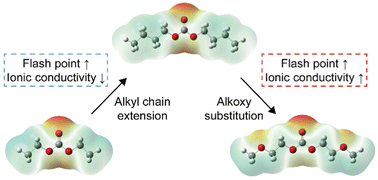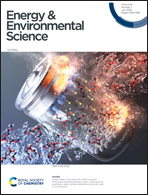Molecularly engineered linear organic carbonates as practically viable nonflammable electrolytes for safe Li-ion batteries†
Abstract
Fire and explosion hazards represent a major barrier to the widespread adoption of lithium-ion batteries (LIBs) in electric vehicles and energy storage systems. Although mitigating the flammability of linear organic carbonate electrolytes in LIBs is an obvious solution to the thermal safety issue, it often comes at the expense of battery performance and cost. Herein, by combining alkyl-chain extension and alkoxy substitution, which simultaneously decreases solvent volatility and increases solvation ability, we demonstrate that molecular engineering of the linear carbonates presents a viable route to achieving thermally stable high-performance batteries. Although the tailored molecule bis(2-methoxyethyl) carbonate (BMEC) exhibits a flash point that is 90 °C higher than that of conventional electrolytes, the electrolyte quality is still maintained, enabling long-lasting cycling of the flagship electrode combination of graphite and Ni-rich layered oxide over 500 cycles in practical pouch cells. Furthermore, unlike a commercial electrolyte, we demonstrate that the BMEC electrolyte effectively alleviates heat and reactive-gas release under thermal/mechanical/electrical abuse conditions in the presence of charged electrodes, thereby preventing the thermal explosion of a 4 A h pouch cell upon nail penetration.



 Please wait while we load your content...
Please wait while we load your content...